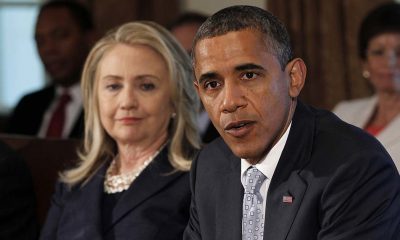World
Indian bribe takers not named in $3.9 mn Louis Berger bribery scam

Washington: Louis Berger International Inc. (LBI), a New Jersey-based construction management company, has admitted it bribed officials in India and three other countries to secure government construction management contracts.
But neither the company which last week agreed to pay a $17.1 million criminal penalty to resolve charges of bribing officials in India, Indonesia, Vietnam and Kuwait, nor the Justice Department has disclosed the names of the bribe takers.
Two of the company’s former executives also pleaded guilty to conspiracy and charges under the Foreign Corrupt Practices Act (FCPA) in connection with the scheme.
Louis Berger has entered into a deferred prosecution agreement (DPA) and admitted its criminal conduct, including its conspiracy to violate the anti-bribery provisions of the FCPA, according to the Justice Department.
The company has also agreed to implement rigorous internal controls, to continue to cooperate fully with the department and to retain a compliance monitor for at least three years.
Richard Hirsch, 61, of Makaati, Philippines, and James McClung, 59, of Dubai, United Arab Emirates, each pleaded guilty to one count of conspiracy to violate the FCPA and one substantive count of violating the FCPA.
Hirsch previously served as the Senior Vice President responsible for the company’s operations in Indonesia, Thailand, the Philippines and Vietnam.
McClung previously served as the Senior Vice President responsible for the company’s operations in India and, subsequent to Hirsch, in Vietnam.
The sentencing hearings for Hirsch and McClung are scheduled for Nov 5.
According to the charging documents, from 1998 through 2010, the company and its employees, including Hirsch and McClung, orchestrated $3.9 million in bribe payments to foreign officials in various countries in order to secure government contracts.
To conceal the payments, the co-conspirators made payments under the guise of “commitment fees,” “counterpart per diems,” and other payments to third-party vendors.
In reality, the payments were intended to fund bribes to foreign officials who had awarded contracts to Louis Berger or who supervised the firm’s work on contracts.
A Louis Berger statement said “in total, the company self-identified and self-reported findings of misconduct in Vietnam, Indonesia, India and Kuwait between 1998 and 2010 totaling $3.9 million in bribes.”
World
Lockdowns in China Force Urban Communities to Defy Censorship and Vent Frustration Online

Shanghai’s rich middle class is leading a wave of online dissent over the strict and prolonged lockdowns imposed in various parts of the country. Chinese internet censorship is struggling as patience is wearing thin in many urban centers, coming up with creative forms of online protests.
Social Media Posts Revealing Lockdown Tension in Shanghai
Drawn-out lockdowns are nothing new in China as authorities insist with the nation’s zero-Covid policy since the start of the pandemic. Currently over This time around, however, metropolitan areas like Shanghai are increasingly difficult to keep quiet, given that its more than 25 million residents have seen weeks of total isolation along with food shortages and many other service interruptions.
Dozens of towns and reportedly over 300 million Chinese citizens have been affected by lockdowns of different severity. As expected, urban netizens have been most outspoken over their difficulties by finding creative ways to get around state censorship and bans placed on topics, news comments and spontaneous campaigns.
Shanghai residents have been using mobile proxies and hijacking seemingly unrelated hashtags to talk about healthcare issues, delivery failures and the overall severity of their situation. The “positive energy” that the Chinese government wants to transmit during the recent prolonged series of lockdowns does not come naturally to those counting food supplies and online censors are working hard to filter words, trending topics and undesired social media sharing.
WeChat groups and message threads are under constant monitoring. Posts questioning the zero-Covid approach have been quickly deleted, including by leading Chinese health experts like Dr. Zhong Nanshan. Video footage is soon censored and protests and investigations are quickly made to disappear.
Where this has not worked, officials have exposed banners with warnings and outright threats like “watch your own mouth or face punishment”, while drones have been patrolling the city skies. Yet, if anything, this has led to further tensions and unspoken confrontation with Shanghai’s educated and affluent middle class.
Creative Online Solutions Harnessing Civic Energy
Announcements by Chinese social media that they would be publishing the IP addresses of users who “spread rumors” have not helped either. Tech industry research has shown that much of Asia’s tech-savvy population has a habit of using mobile proxies and other privacy tools, quickly finding workarounds to browse the internet freely and talk to the world about the hottest topics.
The sheer volume of forbidden posts is already a challenge for the very censorship system, experts explain. Unable to track all trending hashtags, state workers overlook topics that speak about the US, Ukraine or other popular news. Linking human rights elsewhere to their situation, Chinese online dissidents establish their informal channels and “hijack” the conversation to share personal or publicly relevant information about the Covid suppression in their town.
Sarcastic and satirical posts still dominate. Others hope to evade the censors by replacing words from famous poems or the national anthem. One thing is certain – social media, when harnessed with the right creativity, has proven its ability to mount pressure on the government in even some of the most strictly controlled tech environments like China.























